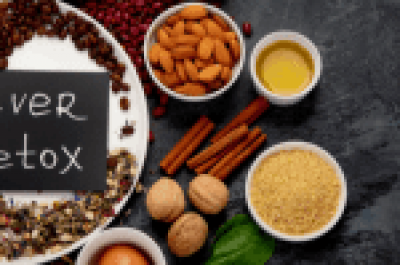Why Functional Medicine Practitioners Prioritize Liver Detoxification

Article Summary
Functional Medicine practitioners highlight the importance of liver detoxification for overall health. The liver plays a central role in detoxification by processing and neutralizing harmful substances in the body. This process, divided into three phases, includes transforming toxins (Phase 1), preparing them for elimination (Phase 2), and removing them from the body (Phase 3). While many detox programs focus on the liver, the gallbladder and intestines are also vital for efficient toxin elimination, making gut health a key part of any detox plan.
In Phase 1, the liver converts fat-soluble toxins into water-soluble forms using enzymes, but this process can create harmful byproducts if not properly managed. Phase 2 neutralizes these byproducts by binding them to compounds that can be safely eliminated, a process that requires nutrients like amino acids, vitamins, and minerals. A nutrient-rich diet is essential for Phase 2 to function effectively. Without balanced support for both phases, harmful metabolites can build up, leading to health problems.
Phase 3 focuses on transporting and excreting toxins via bile and stool, emphasizing the importance of hydration, fiber, and gut health. Issues like poor digestion, magnesium deficiency, or dysbiosis can interfere with this phase, requiring targeted interventions. For those without a gallbladder, special support for bile and liver function may be necessary. A holistic detox program addresses all three phases, promoting efficient toxin removal and better overall health.
Want to know more details?
Check out the full article below.
Functional Medicine practitioners emphasize the significance of detoxifying the liver as a fundamental step toward achieving optimal health. This approach stems from a comprehensive understanding of the intricate processes involved in detoxification and the liver’s pivotal role.
The Detoxification Process
But many detox plans overlook Phase 3, which focuses on transportation and elimination. In this phase, the gallbladder and intestines take over. The liver’s waste is sent to the gallbladder, turned into bile, and then removed from the body through stool. This makes it essential for the gallbladder and intestines to work well for proper toxin removal.
It’s important to recognize that although other routes, such as the skin, lungs, and kidneys, contribute to waste elimination, the bulk of detoxification occurs through stool. Thus, a holistic detox approach must encompass support for Phase 3, underscoring the vital role of gut health in the process.
The absence of a gallbladder in people who have had theirs removed poses an additional challenge as bile secretion becomes contingent upon fat intake. Consequently, those without gallbladders may require support to bolster liver and bile function.
Understanding the Three Phases of Liver Detoxification
Phase 1: Transformation from Fat-Soluble to Water-Soluble
Phase 1 primarily focuses on transforming fat-soluble toxins into water-soluble substances through enzymatic reactions, notably facilitated by the cytochrome P450 enzyme family. While this phase is crucial for initiating detoxification, it generates potentially harmful metabolites, necessitating efficient Phase 2 processing to neutralize them.
Various factors, including dietary choices, environmental toxins, and medication intake influence activation of Phase 1. Imbalances between Phase 1 and Phase 2 detox pathways can lead to the accumulation of harmful metabolites, underscoring the importance of supporting Phase 2 processes.
Phase 2: Conjugation and Elimination
Phase 2 involves conjugation. Conjugation refers to the process in which Phase 1 metabolites (end products) are bound to water-soluble compounds for safe elimination during Phase 3. Phase 2 requires ample energy and an array of nutrients, with each conjugation pathway having distinct nutrient requirements.
A well-rounded detox diet should prioritize nutrient-dense foods that supply essential amino acids, vitamins, and minerals crucial for Phase 2 detoxification. However, deficiencies in these nutrients are prevalent in modern diets, necessitating targeted dietary interventions to optimize Phase 2 processes.
The Interplay Between Phase 1 and Phase 2 Detoxification
While daily consumables and environmental toxins can easily activate Phase 1, inadequate Phase 2 activity can lead to the accumulation of harmful metabolites, manifesting as various health issues ranging from insomnia to chronic diseases. This underscores the importance of a balanced detox program that addresses both phases effectively.
Phase 3: Transportation and Elimination
Phase 3 focuses on transporting Phase 2 conjugates for elimination via bile into the intestines and subsequent excretion through stool. Adequate hydration and optimal gastrointestinal function are essential for facilitating toxin elimination through this phase.
Addressing Potential Obstacles to Phase 3 Detoxification
Issues such as dysbiosis, inadequate fiber intake (fiber acts as a binder), magnesium deficiency, and medication usage can impede Phase 3 detoxification, emphasizing the need for comprehensive assessment and targeted interventions to optimize gut health and promote regular bowel movements.
In essence, a well-designed functional detox program prioritizes liver health by addressing all three phases of detoxification. By supporting efficient biotransformation, transportation, and elimination processes, individuals can effectively rid their bodies of toxins and pave the way for improved overall health and well-being. See this article for tips and tricks for a successful detox or this article on doing a 21-day detox.
Supporting Detox with Hydration and Sleep
Hydration is critical for efficient detoxification as water supports kidney function and helps flush toxins. Similarly, quality sleep enables the body’s natural repair processes and enhances liver efficiency. Drinking at least 8 cups of water daily and prioritizing restful sleep can amplify detox outcomes.
The Role of Antioxidants in Liver Health
Antioxidants play a crucial role in combating oxidative stress, which often arises during detoxification. Foods rich in antioxidants, like berries, leafy greens, and nuts, support liver health by neutralizing harmful free radicals. Adding these foods to your diet helps protect your liver from damage.
Functional Foods for Detoxification
Specific foods, known as functional foods, directly support the detoxification pathways. Garlic, cruciferous vegetables like broccoli and kale, and turmeric are examples. These foods contain bioactive compounds that enhance the liver’s detox capabilities and promote gut health.
The Impact of Stress on Detox
Stress can hinder detoxification by disrupting hormone balance and impairing gut function. Mindfulness practices, like meditation and yoga, reduce stress and support detox efforts by improving overall bodily harmony.
Personalized Detox Approaches
Each person’s detoxification needs vary based on genetics, diet, lifestyle, and environmental exposures. Functional medicine practitioners often use diagnostic tools to tailor detox protocols, ensuring maximum efficiency and safety for each individual.
By addressing these aspects, a comprehensive detox program can empower individuals to improve their health and vitality effectively.
References
-
Liska, DeAnn J., et al. “Detoxification and Biotransformational Imbalances: A Fundamental Aspect of Functional Medicine.” Alternative Medicine Review, vol. 11, no. 1, 2006, pp. 36-49. https://pubmed.ncbi.nlm.nih.gov/16597195/
-
Björnsson, Einar. “Drug-Induced Liver Injury: Hy’s Rule Revisited.” Clinical Pharmacology & Therapeutics, vol. 86, no. 5, 2009, pp. 517-528. https://pubmed.ncbi.nlm.nih.gov/19794476/
-
Jones, Daniel P. “Redefining Oxidative Stress.” Antioxidants & Redox Signaling, vol. 8, no. 9-10, 2006, pp. 1865-1879. https://pubmed.ncbi.nlm.nih.gov/16987039/
-
Wallace, Taylor C. “The Benefits of Probiotics in Functional Foods.” Nutrition Research, vol. 42, 2017, pp. 1-8. https://pubmed.ncbi.nlm.nih.gov/28438663/
-
Dasgupta, Anindya, et al. “Stress and Its Impact on Neuroendocrine-Immunological Interactions.” Brain, Behavior, and Immunity, vol. 26, no. 7, 2012, pp. 1249-1258. https://pubmed.ncbi.nlm.nih.gov/22820042/

Further Reading: Detox
- Successful Detox and Liver Cleanse Tips and Tricks
- Why Integrative Health Practitioners Prioritize Liver Detoxification
- The Transformative Power of Doing a 21-Day Detox Diet
- Liver Cleanse to Avoid Gallstone Pancreatitis
- The Importance of Hydration for Detox Protocols, Lymphatic Flow, and Health
- Vitamins and Minerals for Successful Detox
- Methylation: Importance for Health, Supplements, Symptoms, Genetics, and Best Practices



